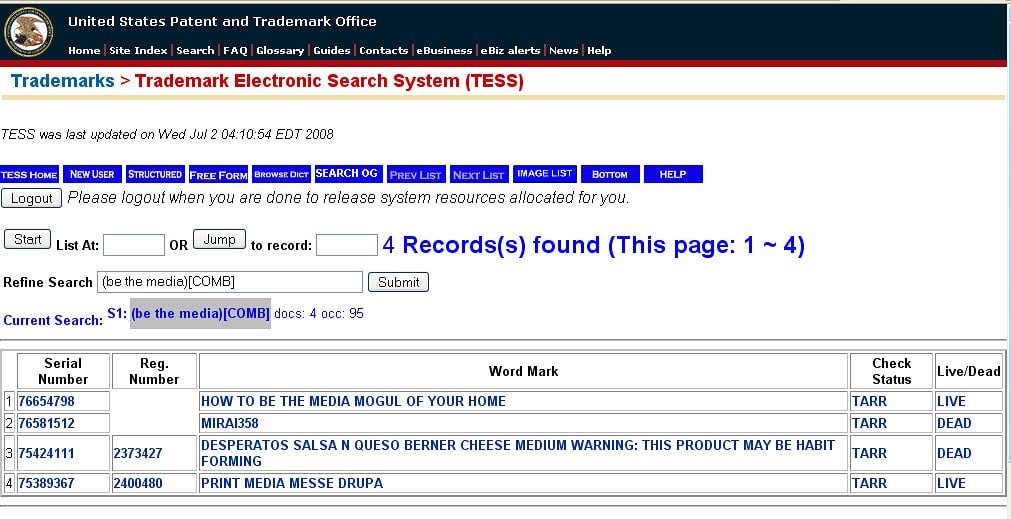If you are buying a business or business assets, almost certainly, the Purchase Agreement will contain some provision for conducting due diligence. Due diligence is an often-lengthy process that occurs after the Purchase Agreement is signed and before the sale is consummated. The process involves confirming all of the details with respect to various aspects of the transaction. For example, the seller must provide documentation — to the satisfaction of the buyer — proving ownership of the assets and that seller can and will transfer title free and clear of liens and encumbrances.
If trademarks are part of the assets being purchased, there are some unique features of trademarks that must be taken into account during the due diligence process. These are in addition to the standard items that must be reviewed and confirmed..
Registration Documentation
In general, the seller will provide a full and complete list of all the trademarks and service marks that are being sold/transferred. The seller should also provide the registration numbers, copies of all applications, search reports with the US Patent and Trademark Office (“USPTO”) (showing current registration) and actual Certificates of Registration. A similar list and set of documentation should be provided if the trademarks are registered internationally and/or if they are registered at the state level. Examination of this documentation is essential during due diligence. Note that an assignment of registration must be made with the Trademark Office to effectuate the transfer of ownership. Note also that trademarks that are in the process of being registered can also be transferred via filings with the Trademark Office.
Any Seller Unregistered Trademarks
Assuming that the buyer is obtaining all of the seller’s registered trademarks, some consideration should be given to any seller unregistered trademarks that are not part of the transaction. The issue is whether leaving unregistered trademarks in the seller’s possession and/or control will cause potential infringement claims post-closing. Often a business will have a cluster of thematically related marks, only some of which are registered. Consider adding unregistered marks to the sale/purchase.
Specimens of Use-in-Commerce
Trademark registration can be lost if the trademark has not been used in commerce. In general, abandonment can occur if there has been non-use during a three-year period. Thus, the Purchase Agreement should contain representations and warranties that the trademarks
- Are currently valid
- Are validly registered
- Have been continually used in commerce
- That the seller has no notice or knowledge of any claim of non-use or abandonment or that the trademark(s) infringe upon another’s trademark
- That the seller has filed for registration renewal, if applicable
Aside from these sorts of representations and warranties, the seller should provide specimens of use-in-commerce. These specimens should be of sufficient quality and quantity to allow the buyer to prove use-in-commerce (or excusable non-use) if there is a post-sale challenge to the validity of the trademarks. Importantly, the specimens of use should apply to all classes for which the trademarks are registered. For example, if a trademark is registered with four classes of goods, the buyer should be provided with specimens of use for all four classes.
Market Watch Documentation
Trademarks can also be lost and deemed abandoned if the trademark has not been protected from infringing use in the marketplace. Thus, any business that owns a trademark should be monitoring the relevant market for infringing uses. As part of the due diligence process, the seller should provide documentation with respect to its market monitoring and all efforts to protect the trademarks. Examples include market watch reports and summaries and any infringement warning letters issued by the seller and/or its attorneys. The absence of market watch documentation should be a “red flag” for a buyer and should, at minimum, cause the buyer to conduct its own extensive search for infringing use in the relevant marketplace.
Licensing
Trademarks can also be lost via the legal doctrine of “naked licensing.” This occurs when an owner allows another to use a trademark without any control over how the mark is used. Thus, as part of the due diligence process, the seller should provide a full list and documentation related to any use-licenses granted, including any verbal or informal or unofficial licenses granted. All written licenses should be closely reviewed and an examination should be undertaken with respect to how the licensees have used the trademark. If the seller states that no verbal or unofficial licenses have been granted, then the Purchase Agreement should contain representations and warranties to that effect.
Trademark Maintenance
Trademark registration can also be lost if the registration is not maintained. Where applicable, the seller should provide documentation that the maintenance filings were made and the fees paid. A calendar of upcoming dates and deadlines is also important to create.
For more information or if you have questions about creating and registering a trademark, contact the trademark lawyers at Revision Legal at 231-714-0100.




